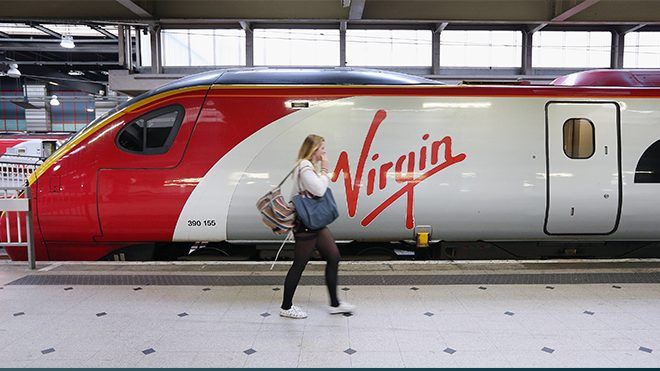Don’t listen to Branson – VTEC is to blame for the East Coast Mainline fiasco

Yesterday the Transport committee published their report on the East Coast Mainline fiasco.
In January the Department for Transport (DfT) declined to renegotiate the contract to run the east coast line, meaning that the joint-venture between Virgin and Stagecoach (VTEC) went into default.
VTEC were quick to blame the failure of Network Rail to deliver planned upgrades for the collapse of their franchise. Richard Branson declared:
But the Transport Committee’s report is clear that responsibility lies with VTEC, and with the flawed franchise system as a whole.
This fiasco is yet another example of how the franchise system has failed.
That’s why we need a publicly funded railway that can deliver a good service, fair terms and conditions and economic benefits for the whole country.
What went wrong?
VTEC went into default because it’s operating surplus wasn’t enough to cover the premiums it had committed to pay to the Department for Transport when bidding for the franchise.
The government refused to renegotiate the terms of their contract with VTEC, but they did agree to release them two years early, saving VTEC from paying nearly £2bn in premiums for which they would otherwise have been liable. Richard Branson wasted no time in blaming Network Rail for £100m of lost revenue for VTEC.
Opponents of publicly owned rail, understandably defensive following an embarrassing failure of private rail provision, focussed on Network Rail to exonerate privatisation.
But the Transport Committee’s report is unambiguous about this:
So who was to blame?
The Committee are pretty clear on that point too.
Their report says that VTEC’s bid for the franchise was “overly optimistic”, that VTEC should have been more realistic about the premiums they could pay to DfT, and that it should have put plans in place in case the economy didn’t grow in the way they’d assumed.
In order to win the franchise VTEC had to commit to paying a set amount back to DfT in the form of premiums based on VTEC’s estimate of passenger numbers.
But in the end passenger numbers didn’t grow in the way VTEC said they would.
The drop in global fuel prices and the freeze on fuel duty made travel by car more affordable relative to train travel. The committee makes clear that, while economic underperformance during the period was well-within the normal distribution, it was too much for the wildly optimistic parameters set by VTEC.
But if VTEC’s bid was unrealistic, why didn’t the DfT pick this up?
Not only did the DfT not query the sunny assumptions that VTEC were making, they praised the bid as “the best they had ever seen”.
So this isn’t just an embarrassing gaff from DfT, its evidence of a systemic problem.
“The DfT encourage overbidding”.
This isn’t just a fluke mistake – it was built in to the Department’s MO.
Unrealistic targets are included in the Invitation to Tender, bids are insufficiently stress tested and there is no agreed set of economic parameters in place against which bids can be assessed.
The DfT say that they were looking out for the best deal for the taxpayer, but it seems pretty clear that this deal was a false economy. Headline figures promise low costs and high returns that are only achievable via heroic optimism and bearing down on terms and conditions of workers. When these figures inevitably prove unrealistic the result is failed franchises, unpaid premiums and desperate attempts to shift the blame.
“No alternative but to let the contract run its course to default”
That was the conclusion of the Committee’s review of the DfT’s decision not to renegotiate the franchise once it became clear VTEC would be unable to deliver on their promises.
As the FT point out, if ministers had allowed a rebasing of the contract this would have reduced the DfT’s expected premiums, undermining the whole franchising system.
Presumably they mean undermining it more than the reputational damage caused by the whole affair.
Enough is enough
The franchise system has failed.
The DfT has already accepted that a public ownership is the best option for the East Coast.
We think it’s the best option for the rest of the of the railway too.
In the meantime, if we must have franchising, bids should be assessed on the terms and conditions they can offer workers, and whether they can actually deliver on their promises.
Stay Updated
Want to hear about our latest news and blogs?
Sign up now to get it straight to your inbox
